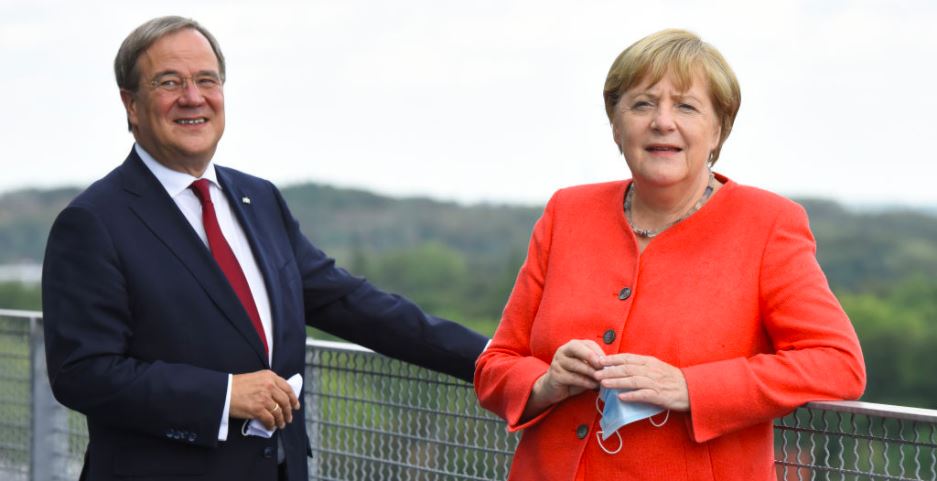Armin Laschet, a senior member of Germany’s Christian Democratic Union (CDU), has gained the support of senior CDU members to run as the Conservative nominee to replace Angela Merkel in September’s federal election. Laschet, who has been the party’s leader since January, has the backing of 77.5 per cent of the board of directors, or 31 members.
While this seems like the CDU, Germany’s ‘conservative’ party, is truly behind a conservative leader, but Armin Laschet is a follower of Merkel’s policies. Merkel’s stamp is now flowing through CDU with major left-liberal policies becoming a mainstay in the party principles. Laschet is known to be an ardent follower of Merkel and is supposedly going to follow her footsteps and policies if he is elected the next chancellor.
Markus Söder, the Bavarian state premier and leader of the CDU’s sister party, the CSU, got just nine votes and will have to concede the race on Tuesday. There were six abstentions. After the board voted, Laschet said, “It’s about the best answers to the pressing questions of the future. And I am ready to run for office on our behalf.”
However, an internal meeting showed a deep split within the CDU board about Laschet’s candidacy, with less unanimous support for their leader than at a more informal display of support a week earlier. After seeing a lack of enthusiasm for Laschet in all federal states except the party leader’s home turf of North-Rhine Westphalia, Peter Altmaier, the economy minister and a close Merkel ally, turned his support to Söder. The Bavarian was also favoured by Christian Democrats from the previously Communist eastern regions.
Laschet is a pro-immigrant, left-leaning leader of the Conservative Party. His absolute resolve to follow Merkel’s policy could spell doom for Germany. Moreover, Laschet is unpopular among the masses. Laschet’s unpopularity is alarming and because of that the socialists and left-wing parties are seeing a rapid rise in their popularity.
The CDU, Germany’s conventional left-leaning faction, has increasingly shifted toward leftist policies under Angela Merkel’s leadership, failing to distinguish itself from real left-leaning parties in Germany.
According to one poll, he has a 12% approval rating, while Bavarian Premier Markus Söder has a 43% approval rating. Just a minority of Germans support Armin Laschet as the Conservative candidate to succeed Angela Merkel in elections later this year, according to another poll.
The CDU elite has prioritised ascendency in the Conservative bloc by backing Laschet, 60, over the possibility of being guided to victory by Söder, 54, who is seen as a less team player than the Rhinelander. According to polls, Söder is more successful than Laschet, so the possibility of losing votes if Laschet runs for chancellor has alarmed some of his own CDU members.
The disarray in the Conservative camp contrasted with the opposition Greens, who elected their co-leader Annalena Baerbock as their first candidate for chancellor in the party’s 40-year history on Monday with no internal wrangling. The conservatives maintain a slim lead over the Greens in polls, but the leadership schism threatens to jeopardise their attempts to expand their 16-year grip on power without Merkel, who has led them to four victories in a row.
The Green Party is being touted as being the kingmakers in the upcoming elections which will allow them to be able to wield much power in the Bundestag. During the regional elections in prosperous Baden-Württemberg, the heartland of the car industry in the country, the Green party took 32.6 per cent of the votes. In southwest Rhineland-Palatinate, according to preliminary results, the Greens more than doubled their seats in the state legislature by 9.2%.
It contrasted sharply with the Christian Democrats of Chancellor Angela Merkel that posted their worst election results in either region. While the political personality behind local votes makes it difficult, senior Christian Democrats characterise weekend results as a ‘wakeup’ call to draw broad conclusions about the federal elections in September.
Allowing illegal immigration across Germany and pushing European states to follow in Germany’s footsteps was a key policy decision of Angela Merkel and the CDU. With the Greens slated to play a predominant role in the formation of the government in the upcoming federal elections, Germany is headed straight for the black hole of a leftist government that will push its left agenda up to the hilt.
The growing popularity of the Green Party and Laschet’s unpopularity could put the CDU into a coalition with the Greens in an attempt to hold on to power. While many political analysts had backed Soeder to become the Chancellor candidate, Laschet’s nomination means that the CDU wants to hold on to power.
